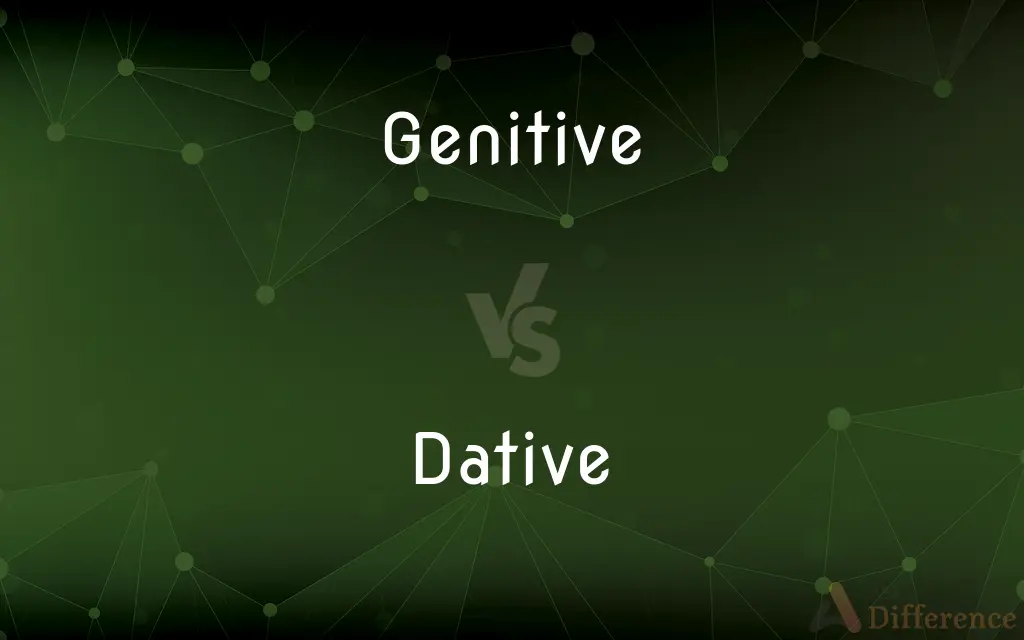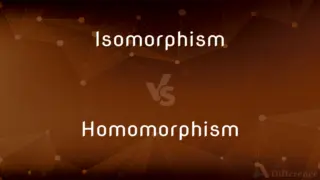Genitive vs. Dative — What's the Difference?
By Tayyaba Rehman & Fiza Rafique — Updated on March 28, 2024
The genitive case denotes possession, showing a relationship between two nouns, whereas the dative case indicates the indirect object of a sentence, reflecting to whom or for whom an action is performed.

Difference Between Genitive and Dative
Table of Contents
ADVERTISEMENT
Key Differences
In grammar, the genitive case is used to express ownership or a relationship between nouns. It often translates to "of" or " 's" in English. For example, in the phrase "the book's cover," "book's" is in the genitive case, indicating possession of the cover. On the other hand, the dative case is utilized to denote the indirect object of a verb, usually indicating to whom or for whom an action is done. In the sentence "I gave the book to John," "John" would be in the dative case in languages that use case to show grammatical relationships, signifying the recipient of the book.
While the genitive case focuses on ownership and relationships, the dative case emphasizes the direction of an action towards an indirect object. This difference helps to clarify the roles that different nouns play within a sentence, contributing to the richness and precision of language. Whereas, in many languages, prepositions or word order may accomplish what the dative case does in others.
The use of the genitive can extend beyond simple possession to describe characteristics, origins, and various relationships, such as "a mile's distance" or "a summer's day," where the genitive expresses a quality or attribute. In contrast, the dative can also indicate benefits, disadvantages, or relevance to a person or thing, as in "This gift is for her," where "her" would be in the dative case in certain languages, showing the benefit towards her.
Languages vary widely in how they use and form the genitive and dative cases. Some languages have distinct endings for nouns and pronouns in the genitive and dative cases, while others may use prepositions or rely on word order to convey the same relationships. This variability highlights the diversity of linguistic structures across languages.
Comparison Chart
Primary Function
Indicates possession or relationships
Indicates the indirect object of a verb
ADVERTISEMENT
Typical Indicators
"of" or " 's" in English
Prepositions "to" or "for" in English
Examples
"John's book," "the leg of the table"
"I gave the book to John"
Usage Beyond Core Function
Describes characteristics or origins
Indicates benefits, disadvantages, or relevance
Formation
By adding specific endings or using prepositions in some languages
By changing the noun or pronoun form, or using prepositions in some languages
Compare with Definitions
Genitive
Shows ownership or association between two nouns.
Anna's bicycle needs repair.
Dative
Indicates the indirect object of a verb.
She sent him a letter.
Genitive
Expresses measurements or quantities.
A day's journey.
Dative
Reflects to whom or for whom an action is performed.
He bought flowers for his mother.
Genitive
Often translates to "of" or " 's" in English.
The title of the book is intriguing.
Dative
Can denote a beneficiary or affected party.
This book was written for children.
Genitive
Utilized to describe characteristics.
A sound of immense depth.
Dative
Expresses location or direction in some contexts.
We went to the store.
Genitive
Can indicate origin or type.
A problem of great importance.
Dative
Used with certain verbs and prepositions in many languages.
They explained the situation to us.
Genitive
Of, relating to, or being the grammatical case expressing possession, measurement, or source.
Dative
Of, relating to, or being the grammatical case that marks the recipient of action, that often indicates the indirect object of the verb, and that can be used with prepositions or other function words corresponding in meaning to English to and for.
Genitive
Of or relating to an affix or construction, such as a prepositional phrase, characteristic of the genitive case.
Dative
The dative case.
Genitive
The genitive case.
Dative
A word or form in the dative case.
Genitive
A word or form in the genitive case.
Dative
(grammar) Noting the case of a noun which expresses the remoter or indirect object, generally indicated in English by to or for with the objective.
Genitive
(grammar) Of or pertaining to that case (as the second case of Latin and Greek nouns) which expresses a quality, origin or possession. It corresponds to the possessive case in English.
The student who had taken a German exam realised his error afterwards. He had used the dative case instead of the genitive case to show possession.
Dative
In one’s gift; capable of being disposed of at will and pleasure, as an office or other privilege.
Genitive
An inflection pattern (of any given language) that expresses origin or ownership and possession.
Dative
Removable, as distinguished from perpetual; — said of an officer.
Genitive
A word inflected in the genitive case; a word indicating origin, ownership or possession.
Dative
Given by a judge, as distinguished from being cast upon a party by the law itself.
Genitive
Of or pertaining to that case (as the second case of Latin and Greek nouns) which expresses source or possession. It corresponds to the possessive case in English.
Dative
(science) Formed by two electrons contributed by one atom; see dative bond.
Genitive
The genitive case.
Dative
Given in advance; not needed to be calculated.
Genitive
The case expressing ownership
Dative
(grammar) The dative case.
Genitive
Serving to express or indicate possession;
Possessive pronouns
The genitive endings
Dative
(grammar) A word inflected in the dative case.
Dative
Noting the case of a noun which expresses the remoter object, and is generally indicated in English by to or for with the objective.
Dative
In one's gift; capable of being disposed of at will and pleasure, as an office.
Dative
The category of nouns serving as the indirect object of a verb
Common Curiosities
Can a noun be in both the Genitive and Dative Case?
Yes, depending on the context and the language, a noun can be in either case, but the meaning and function in the sentence will differ.
What is the Dative Case?
The dative case is used to denote the indirect object of a verb, indicating to whom or for whom an action is performed.
What is the Genitive Case?
The genitive case is a grammatical case used to indicate relationships between nouns, primarily showing possession.
Why are the Genitive and Dative Cases important?
They are crucial for indicating different types of relationships between words in a sentence, contributing to the clarity and precision of communication.
Is the Dative Case only for indirect objects?
While primarily for indirect objects, it can also express benefits, directions, or locations, depending on the language and context.
How are the Genitive and Dative Cases formed?
Formation varies by language, often involving specific endings for nouns and pronouns, and sometimes the use of prepositions.
How does one identify the Dative Case in English?
In English, the dative case is usually indicated by prepositions "to" or "for" before the indirect object, as English does not have explicit case endings for nouns.
How do the Genitive and Dative Cases differ?
The genitive case shows possession or relationships, while the dative case indicates the recipient or beneficiary of an action.
Do all languages use the Genitive and Dative Cases?
Not all languages explicitly use these cases; some may convey similar relationships through prepositions, word order, or other means.
Can the Genitive Case indicate more than possession?
Yes, it can also indicate characteristics, quantities, relationships, and origins.
Share Your Discovery

Previous Comparison
Collectivism vs. Socialism
Next Comparison
Isomorphism vs. HomomorphismAuthor Spotlight
Written by
Tayyaba RehmanTayyaba Rehman is a distinguished writer, currently serving as a primary contributor to askdifference.com. As a researcher in semantics and etymology, Tayyaba's passion for the complexity of languages and their distinctions has found a perfect home on the platform. Tayyaba delves into the intricacies of language, distinguishing between commonly confused words and phrases, thereby providing clarity for readers worldwide.
Co-written by
Fiza RafiqueFiza Rafique is a skilled content writer at AskDifference.com, where she meticulously refines and enhances written pieces. Drawing from her vast editorial expertise, Fiza ensures clarity, accuracy, and precision in every article. Passionate about language, she continually seeks to elevate the quality of content for readers worldwide.














































